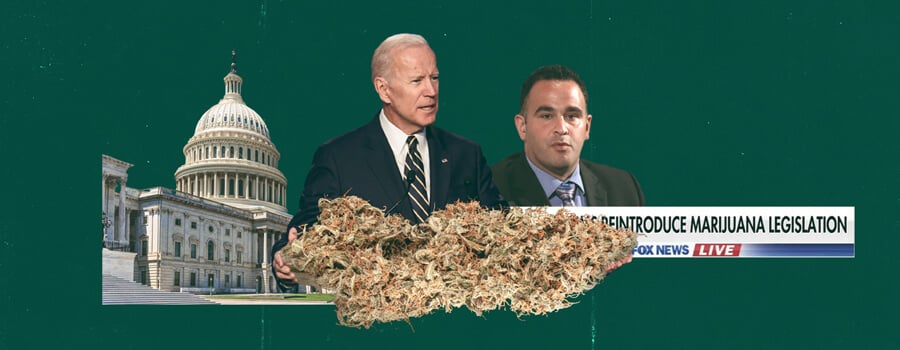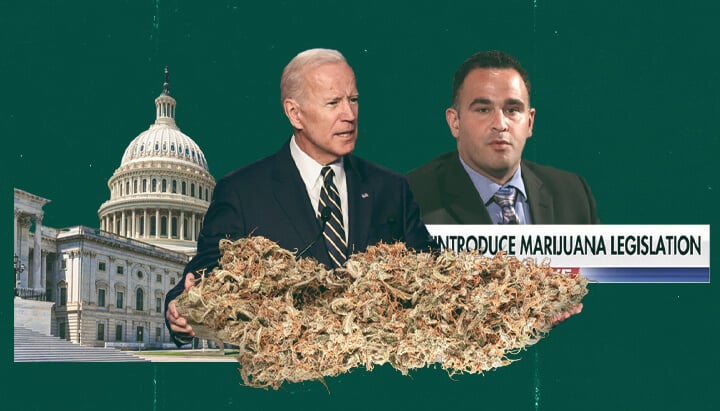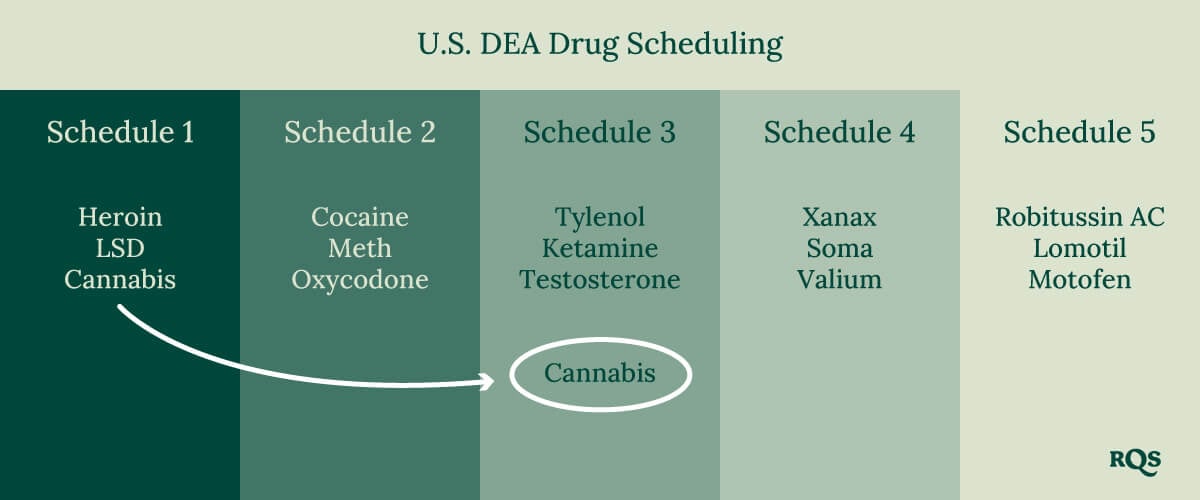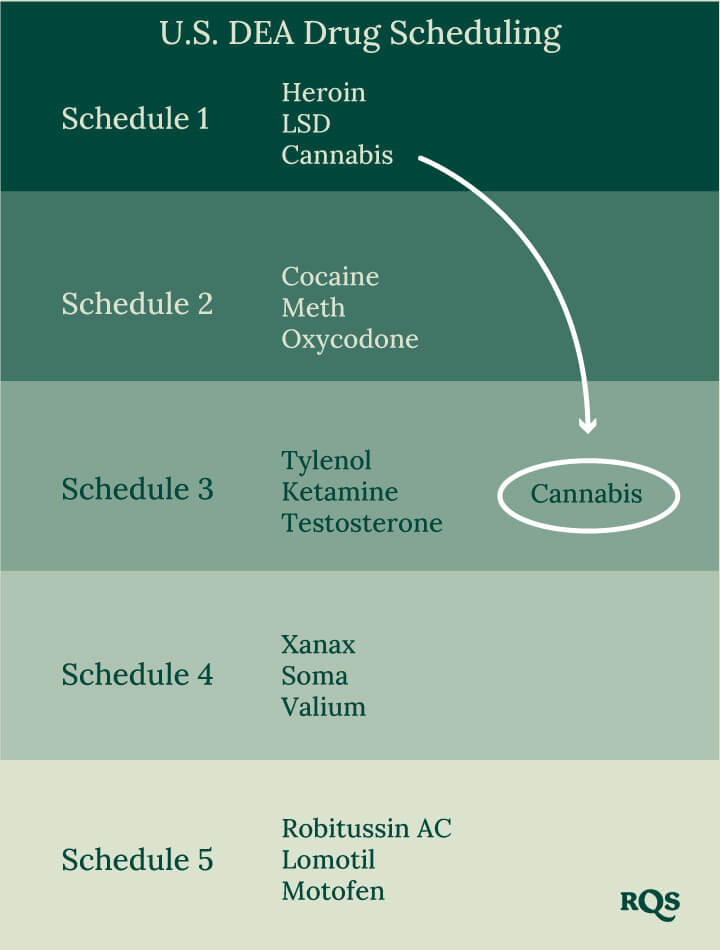.

The DEA Moves to Reschedule Cannabis in the USA
The attorney general of the United States recently sent a proposal to the DEA to reclassify cannabis from a Schedule I substance into a Schedule III substance. This change will potentially open up a legal medical market in the country following FDA approval in the future, and make it easier for researchers to study cannabis.
Agencies in the United States are currently carrying out a legal process to reclassify cannabis at the federal level. Politicians in the country seem to be pushing for the completion of reviews and law changes prior to the November presidential election. Rescheduling cannabis from a Schedule I substance to a Schedule III substance will lay the foundation for federally legal medical cannabis, and make it easier for scientists to study the plant. Find out everything you need to know about this important weed news below.
Contents:
Division appears within the DEA
The Drug Enforcement Agency (DEA) in the United States is currently rolling out a process that will culminate in the organisation’s largest policy change in over 50 years: the rescheduling of marijuana. The move will remove cannabis from its Schedule I status, where it sits alongside heroin and LSD, and place it into the Schedule III category, where substances such as ketamine and anabolic steroids are placed.
Triggered by the Biden administration, this rescheduling has caused further rifts between factions of the Democratic and Republican parties and has stoked division within the DEA itself. According to Justice Department Director of Public Affairs Xochitl Hinojosa, Attorney General Merrick Garland sent a proposal to reclassify cannabis that circulated throughout the DEA on May 1st. Garland himself signed the proposal, adding some heavy political weight to the move.
However, fissures within the agency became apparent as DEA Administrator Anne Milgram refused to sign[1] the proposal. Kevin Sabet, co-founder of Smart Approaches to Marijuana (SAM) and leading opponent of cannabis legalization in the United States, commented: “Her courage will show she was on the right side of history. It’s equally hard to overstate what a botched process the Biden Administration’s rescheduling review has been from the outset. This unprecedented action by the attorney general reflects a process poisoned by political considerations and conducted with a predetermined outcome”.
Despite the apparent intra-agency revolt, the road to cannabis rescheduling has the weight of both the president and attorney general behind it, and an already established roadmap set in place.
The Biden Administration's Plan to Reclassify Marijuana
During his presidential campaign, President Joe Biden stressed his belief that no one should be in jail for using or possessing cannabis. Biden reaffirmed this message in a White House statement[2] released in October 2022, in which he noted the impact of criminal records related to marijuana offences on the employment, housing, and educational opportunities of those affected. Biden went on to outline three steps aimed at repairing the United State’s failed approach to marijuana policy.
First, Biden directed the attorney general to put together a plan to pardon all previous federal offences for the simple possession of cannabis. Right now, there are no inmates spending time in prison for this offence. However, it will help those with a previous conviction to access jobs. Second, the president also urged all governors to pardon offences on the state level.
Finally, the third step directly addressed the current classification of cannabis. Biden stated his intention to ask the secretary of health and human services (HHS) and the attorney general to review the current classification of the controlled substance. The classification system used by the DEA defines[3] Schedule I substances as having a high potential for abuse and no currently accepted medical use. Moving marijuana to Schedule III will require a review to prove that the plant meets the definition of substances with this classification—defined as having moderate to low potential for physical and psychological dependence.
The Marijuana Reclassification Timeline
So, when can citizens in the United States expect the federal government to take a much more relaxed, yet still prohibitive, stance on cannabis? Well, it all depends on how fast the rest of the process moves. Next, the White House Office of Management and Budget must review the proposal to reschedule cannabis. If successful, the DEA would then have to launch a public comment period in order to hear the concerns of citizens surrounding the legal change. Then, an administrative judge will have to review these comments, leaving the DEA to publish the change in classification.
Currently, the DEA is under significant pressure to get the ball rolling after the HHS concluded its scientific review into cannabis prior to the department’s comments on marijuana rescheduling. It typically takes the DEA up to six months to review HHS recommendations. However, eight months later, the agency still hasn’t concluded this process. External agencies and politicians are now mounting pressure on the DEA to speed up the proceedings. A group of 21 lawmakers have urged the DEA to “promptly remove marijuana from Schedule I”. The coalition commented[4]: “While we understand that the DEA may be navigating internal disagreement on this matter, it is critical that the agency swiftly correct marijuana’s misguided placement in Schedule I”.
Meanwhile, the Food and Drug Administration (FDA) has criticised[5] the delay, and Vice President Kamala Harris has also applied pressure to ensure the review concludes swiftly.
The Impact of Rescheduling Marijuana in the United States
This recent development in marijuana news could have a big impact on several important sectors. To start, the approaching marijuana reclassification will have positive consequences for cannabis businesses operating legally on the state level. Currently, these companies are excluded by the Internal Revenue Service (IRS) from benefitting from federal tax deductions owing to the Schedule I status of cannabis. Known as Section 280E of the Internal Revenue Code, this legislation[6] forbids businesses from deducting business expenses that are associated with the trafficking of Schedule I and Schedule II substances. The reclassification of cannabis to Schedule III would benefit the balance sheet of countless businesses across numerous states.
Moreover, the current legal status of cannabis at the federal level has erected significant barriers to entry[7] when it comes to studying the plant and its compounds within the United States. As things stand, researchers have to navigate a series of reviews involving the National Institute on Drug Abuse (NIDA), the FDA, and a host of institutional review boards and departments of state government.
Even if scientists get the go-ahead from regulatory bodies, they have to depend on a supply of cannabis from the NIDA Drug Supply Program, which has focused much more heavily on the research around addiction and abuse as opposed to therapeutic investigations. While some roadblocks will remain, rescheduling will make it significantly easier[8] for scientists to research the therapeutic potential of cannabis.
Reclassification Does Not Equal Legalization
Despite benefitting cannabis businesses in legal states and freeing up scientists to research cannabis more easily, reclassification of the herb does not equal federal marijuana legalization. In fact, lacking further legislative changes, the proposed reclassification of cannabis would mean that both medical and recreational cannabis businesses operating at the state level are still acting outside of compliance[9] with federal controlled substances laws.
However, the federal view on medical marijuana may change over time with the substance’s rescheduling. With accepted medical use in the eyes of the DEA, Schedule III substances may lawfully be prescribed. However, all prescription drugs require approval by the FDA, and marijuana currently lacks FDA approval. Even with FDA approval, businesses would still need to register with the DEA and adhere to its regulations. While much won’t change in the near future, eventual approval by the FDA could trigger a medical cannabis market that complies with federal law.
Marijuana Rescheduling: Public Opinion & Election Results
Cannabis currently ranks as the most used illegal substance in the United States. According to survey data[10] collected in 2022, a massive 61.9 million citizens aged 12 or older used cannabis within the past year, with 42.3 million having used it in the past month. Adding to this, data from a Gallup poll[11] found that 70% of Americans believe cannabis should be legalized. While the Biden administration’s reclassification won’t legalize the herb, the act will certainly appeal to potential voters in the up-and-coming presidential election. With his VP Kamala Harris currently applying pressure to the DEA to speed up their review process to get the reclassification ball rolling, things seem to be lining up nicely for when the voting booths open in November.
By state, as of 2023
Recreational and Medical Medical Not Legalized
Rules vary in each jurisdiction, check state and local laws. CBD only states not included.
Legal Weed: The United States Is Ahead of the Curve
While cannabis will remain illegal at the federal level even following the rescheduling of the plant, the United States as a whole remains one of the most liberal countries when it comes to marijuana. Individual states are free to legislate their own cannabis laws, and citizens all over the country enjoy legal cannabis in their local jurisdictions. Plus, Americans can legally buy and possess cannabis seeds, as they fall outside of the DEA’s Controlled Substances Act because they are viewed as hemp products due to extremely low THC concentrations. This legal reality has made it possible for companies such as Royal Queen Seeds to set up shops in the country and supply growers with world-class cannabis genetics in seed form.
The reclassification of cannabis will also likely open the gate for full federal legislation in the future. Eventually, approval by the FDA will open up a legal nationwide medical market. On top of this, rescheduling will lower the barriers for researchers, enabling them to discover more about the plant, including evidence that could lead to its eventual liberation by the federal government.
- DEA Administrator 'Did Not Sign Off' https://www.marijuanamoment.net
- Statement from president Biden on marijuana reform https://www.whitehouse.gov
- Drug Scheduling https://www.dea.gov
- DEA Agrees To Reschedule Marijuana Under Federal Law https://www.marijuanamoment.net
- FDA Head Says There's 'No Reason For DEA To Delay' Rescheduling Marijuana https://www.marijuanamoment.net
- Vermont General Assembly https://legislature.vermont.gov
- Challenges and Barriers in Conducting Cannabis Research https://www.ncbi.nlm.nih.gov
- Marijuana reclassification will make it somewhat easier to study https://www.npr.org
- Legal Consequences of Rescheduling Marijuana https://crsreports.congress.gov
- The Federal Status of Marijuana and the Policy Gap with States https://crsreports.congress.gov
- Grassroots Support for Legalizing Marijuana Hits Record 70% https://news.gallup.com












































